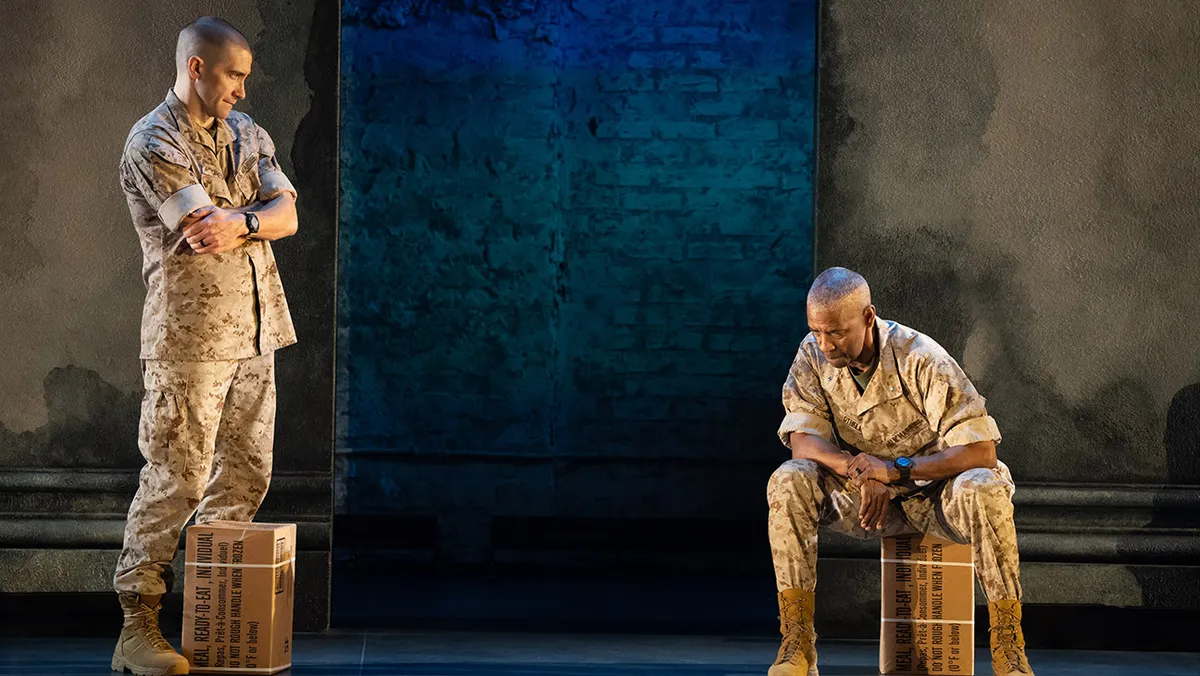
There’s no denying Denzel Washington’s magnetism. With a commanding presence and a voice that carries a natural gravitas, the two-time Oscar winner remains a significant draw for audiences. Many are paying upwards of $900 to see his performance in Kenny Leon’s revival of Othello on Broadway, despite the production's shortcomings. In the role of the Venetian general, often referred to as “the Moor,” Washington exudes the steely charisma of a man who has transcended societal prejudices through his military excellence.
However, the performance lacks a driving force, which is indicative of the production as a whole. The setting, designed by Derek McLane, features a stately backdrop of distressed classical grandeur. This modern-dress Othello is presented in “The Near Future,” as indicated by an opening projection. Yet, this is as far as the overarching concept goes, leaving the production feeling somewhat disjointed.
One of the production's highlights is Jake Gyllenhaal’s portrayal of Iago, one of Shakespeare’s most notorious villains. Gyllenhaal effectively conveys the deep-seated hatred and resentment of Iago, particularly after being overlooked for a promotion by the esteemed Othello. His performance adds a layer of charm to the character's manipulative nature, making it believable that many are easily deceived by Iago, who is often labeled as “Honest Iago.” However, the intense ambition and treachery that should envelop the final scenes feel oddly fleeting.
Interestingly, the performances of secondary characters like Cassio and Emilia outshine Washington at times. Andrew Burnap and Kimber Elayne Sprawl deliver compelling portrayals that inject vitality and emotional depth into their roles. Yet, Iago’s insidious plotting against Cassio lacks the dramatic tension it requires to resonate effectively.
Having previously won a Tony Award for his powerful work in August Wilson’s Fences, Washington is undoubtedly a great stage actor. His returns to Broadway have consistently showcased his range, from a contemplative Brutus in Julius Caesar to the energetic Walter Lee Younger in A Raisin in the Sun. His performance in The Iceman Cometh displayed a complex character, revealing layers of showmanship and emptiness.
Despite his undeniable movie-star presence, Washington’s performance in this production often feels unbalanced. The first act drags, with Washington appearing to conserve energy for the climactic moments when Othello is consumed by jealousy and rage. Unfortunately, the character struggles to connect with Iago, who exploits his misplaced trust, or with Desdemona, his wife, who is wrongfully accused of infidelity.
Desdemona, while not one of Shakespeare’s strongest female characters, is portrayed by London stage regular Molly Osborne, who attempts to bring a duality of self-possession and vulnerability to the role. However, her performance remains flat, failing to leave a lasting impression. It's only after intermission that Washington begins to showcase glimpses of a more engaging portrayal, particularly as Othello's mind unravels under the weight of betrayal.
The pivotal strangulation scene, where Othello struggles with his emotions while confronting Desdemona, should evoke a powerful response. Yet, the audience’s inappropriate laughter during intense moments suggests a disconnect, with some perhaps too starstruck to grasp the play's tragic nuances.
The production's staging raises questions, particularly during the strangulation scene where a gauzy curtain lowers in front of the bedroom, accompanied by melodramatic music reminiscent of 1950s Hollywood. This visual choice feels inconsistent with the otherwise stark design elements, contrasting sharply with the techno beats used during scene transitions.
Kenny Leon, who has previously collaborated successfully with Washington, faces challenges in this production. The lack of a cohesive vision is evident from the start, particularly with the gimmicky introduction of the handkerchief—a crucial element in the plot—fluttering in the air as the play begins. While pacing is essential, the hurried delivery of key dialogues often strips the language of its inherent poetry and expressiveness.
Despite attempting to highlight the virulent racism inherent in the early scenes, the production struggles with inconsistencies, particularly concerning Iago’s character arc and his marriage to a Black woman. Fortunately, Sprawl’s portrayal of Emilia stands out as a beacon of strength and loyalty, while Burnap’s Cassio resonates emotionally, evoking sympathy that is often lacking for Othello and Desdemona.
Ultimately, every staging of a classic like Othello should strive for originality, yet it’s hard not to draw comparisons. This revival may leave audiences wishing for the cohesion and intensity of past productions, such as the 1982 revival featuring James Earl Jones, or Sam Gold’s 2016 version, which effectively recontextualized the play within a contemporary military setting. Unfortunately, this revival falls short of those high standards, lacking the dramatic unity and emotional impact that Shakespeare’s tragedy demands.